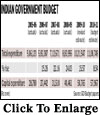The Budget Session of Parliament ended Friday. First, the good news. There were some good debates during the session. The National Green Tribunal Bill saw constructive intervention by MPs across party lines. Environment minister Jairam Ramesh acknowledged some of the contentious issues, and incorporated amendments in the Bill. The budget and finance bills were also debated at length.
The Rajya Sabha examined the working of ministries, including that of food, consumer affairs and public distribution system, and the home ministry. The session also saw detailed discussion on controversial issues such as price rise, left-wing extremism, telephone-tapping, the working of the Medical Council of India and parameters for conducting the census.
The government had listed the Civil Nuclear Liability Bill for introduction on March 15; some Opposition MPs gave notice that they would object to the introduction; and the government deferred the Bill, finally introducing it on the last day of the session.
 Now the bad news. Parliament met for 32 days, three short of the original plan of 35 sittings. And even on these days, it saw frequent disruptions and adjournments. The incident in the Rajya Sabha, when seven MPs were suspended during the debate on the Women’s Reservation Bill, has been widely reported. But disruptions were also seen over other issues, including inflation, the alleged scam in the allocation of 2G spectrum, petroleum prices, and the Indian Premier League. In all, the Lok Sabha worked for 66% of the scheduled time, and Rajya Sabha for 74%.
Now the bad news. Parliament met for 32 days, three short of the original plan of 35 sittings. And even on these days, it saw frequent disruptions and adjournments. The incident in the Rajya Sabha, when seven MPs were suspended during the debate on the Women’s Reservation Bill, has been widely reported. But disruptions were also seen over other issues, including inflation, the alleged scam in the allocation of 2G spectrum, petroleum prices, and the Indian Premier League. In all, the Lok Sabha worked for 66% of the scheduled time, and Rajya Sabha for 74%.
The worst hit was Question Hour. Both Houses made some changes in the rules to tackle the situation of the absent questioning MP. The question would still be answered and other MPs permitted to ask supplementary questions. However, frequent disruptions in the first hour of the day resulted in the loss of productive time. In Rajya Sabha, on 13 days, not even one question was answered; the figure for Lok Sabha was eight days. In both Houses, only about half the planned time was used to answer questions.
The initial plan was to pass 27 bills (other than those related to the Union and Railway Budgets). Parliament passed six bills. These included the validation of an ordinance that provided for regulation of construction near protected monuments; the Green Tribunal Bill which provided for environment courts; amending eligibility conditions for beneficiaries of the employee state insurance corporation; increasing the upper limit of gratuity payments to Rs 10 lakh, amending the plantation labour act to increase safety measures for workers; and creating a legislative council for Tamil Nadu.
Some of these bills were passed without any debate. Of the total 12 non-financial bills passed in Lok Sabha, five were passed without discussion. The Rajya Sabha discussed each of the seven bills that it passed.
Seven bills were passed by only one House. The Women’s Reservation Bill was passed by the Rajya Sabha but was not taken up for discussion in the Lok Sabha. The Prevention of Torture Bill passed by Lok Sabha specifies jail terms for public officials guilty of inflicting torture but prosecution requires both government sanction and complaint within six months of the action.
The government had listed 64 bills (unrelated to the budget) for introduction during the session. It introduced 28. These included the civil nuclear liability bill, and four bills on regulating higher education including the foreign universities Bill.

